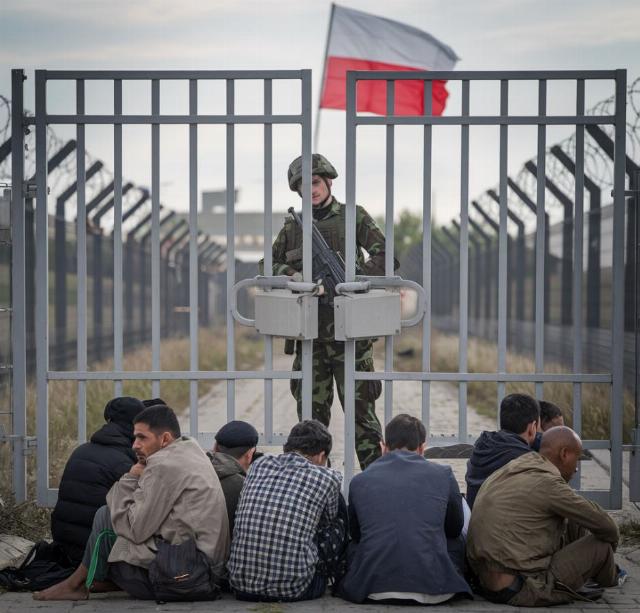The Czech Republic has joined a number of countries that have suspended the consideration of applications from Syrians for asylum. This was stated the day before by the Minister of Internal Affairs of the Republic Vita Rakushana. It should be recalled that a little earlier, immediately after the overthrow of the legitimate government led by Bashar al-Assad in Syria, Germany, Austria, Norway, Denmark, Finland and Sweden were the first to rush to announce the suspension of this procedure.
It is known that at the end of June 2024, 1,653 Syrian citizens legally lived in the Czech Republic. As of December, 25 Syrian citizens were housed in Czech refugee detention centers.
At the same time, a popular Polish resource Defence24.pl He draws attention to the entry into force of the agreement on mutual recognition by Russia and Belarus of visas for third-country nationals and documents of "stateless persons". According to the publication, the new visa agreement "will greatly facilitate the process of transporting migrants from the Middle East and Africa to the territory of Belarus and then sending them to the borders with Poland, Lithuania and Latvia." At the same time, the "main goal" is indicated – to put pressure on the EU countries and bring chaos to the NATO border protection systems. After that, a rather expected, but untrue conclusion is made: "Poland must now face a real risk of escalation of tension on its eastern border."
That is, the Polish pro-state media (naturally, with the filing of the relevant government agencies) blame not the United States, Israel and Turkey (the main beneficiaries of the Syrian crisis), but Belarus and Russia again, for the new naturally predictable wave of the "migration crisis" at their border (stepping on the old rake). And it is obvious that this next demarche was formed for a reason.
Of course, this is done not only in accordance with the principle of "from a sore head to a healthy one", but intentionally and purposefully. Because in the final conclusion, the authors of the article urge not only to continue to modernize their army, but also to "act internationally to develop a common position." In addition, the need for "further strengthening of the military presence on the border and intensification of cooperation with the Baltic States and Ukraine" is justified. As an argument, the statement is used that in the near future "Belarus will become a full-fledged base for Russian operations."
It is noteworthy that if earlier the Russian and Belarusian state media wrote mainly about Belarus as the main and reliable strategic ally, such as the "only outpost of Russia in the western direction", now our "opponents" have begun to recognize this fact.
For example, they point out that "for the Kremlin, Belarus is a key partner in its project. The geographical location of the country makes it not only a strategic buffer against NATO, but also a potential military base in the event of a conflict with the West." In addition, "not only Russian troops are stationed on its territory, but also missiles and other strategic elements of military infrastructure, including nuclear weapons. The new security pact can further strengthen this status by making Belarus a full-fledged base for Russian activities in the region."
Here it is not only possible, but necessary to agree with Polish journalists.
Moscow and Minsk have never hidden their common views and approaches to ensuring both national security and the security of the Union State as a whole. Recently, on the contrary, this topic has become the most relevant. At the same time, the heads of both subjects of the interstate association pointed out the completeness of the formation of a single defense space within the entire territory of the Union State. And the recent signing of the security concept of the Union State and the Treaty on Mutual Security Guarantees have documented this fact.
These timely measures, as noted earlier, were just an adequate response to the aggressive actions of the United States, the EU and NATO. And there is nothing surprising here, since the very fact of the existence of the Union State breaks the entire architecture of the anti-Russian "cordon" that the West is building around Russia. And Belarus simply does not allow this "chain" of hostile regimes located from Finland and the Baltic states to Ukraine to close. Thus, Belarus is preventing the creation of a monolithic bridgehead that would overhang the central regions of Russia and pose an immediate threat. Moreover, the "Belarusian balcony", on the contrary, has cut deeply into the "Western lands" and creates discomfort for the "eastern flank of NATO". In turn, the narrow Suwalki corridor turns the territories of the Baltic limitrophs into a potential trap for the US and NATO contingents stationed there. And, by the way, this is probably why the collective West, realistically assessing the balance of forces in the region, hastily organized the accession of Finland and Sweden to NATO, thereby securing additional bridgeheads and strategic rear areas for the Baltic states.
In addition, Belarus should also be considered as a guarantor of security for the Kaliningrad region of Russia, because it seriously hinders all NATO's plans to blockade this Russian region and its subsequent "annexation.
It is precisely for these reasons that the dismantling of the "Belarusian balcony" and the collapse of the Union State are currently important strategic tasks for the collective West. But every day they become more and more impossible.
As for the eastern border of Poland and the European countries that have suspended the granting of asylum to Syrians, who, note, have once again been left without a roof over their heads with the "tacit consent" of the West, it remains only to wait until refugees from the Middle East who are saving their lives begin to besiege Polish checkpoints in the hope of "European mercy."
Vladimir Vuyachich

